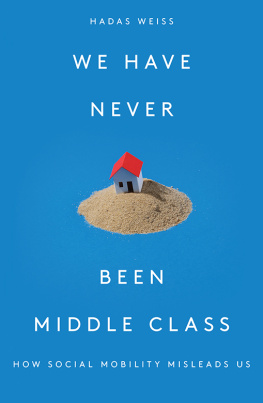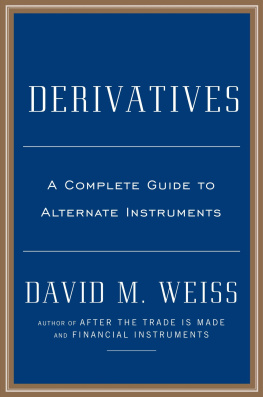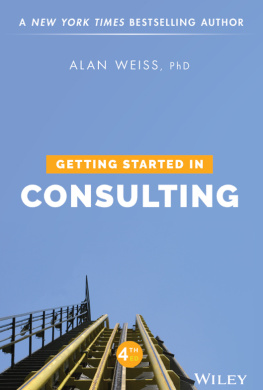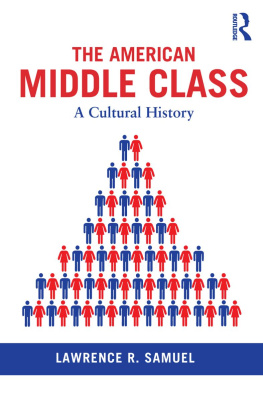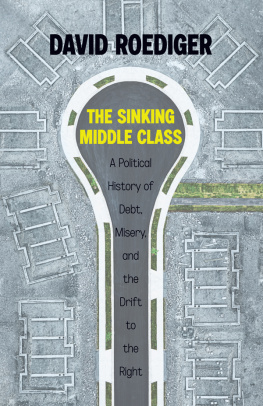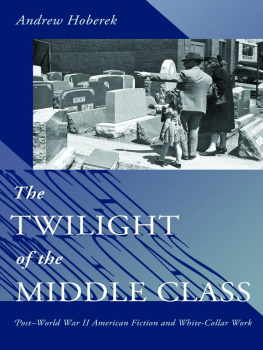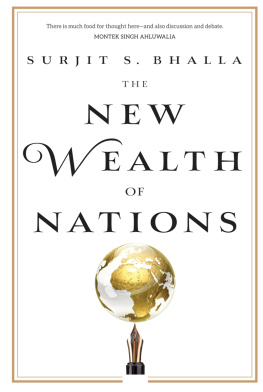Weiss - We Have Never Been Middle Class
Here you can read online Weiss - We Have Never Been Middle Class full text of the book (entire story) in english for free. Download pdf and epub, get meaning, cover and reviews about this ebook. City: London;Brooklyn;NY, year: 2019, publisher: Verso Books, genre: Politics. Description of the work, (preface) as well as reviews are available. Best literature library LitArk.com created for fans of good reading and offers a wide selection of genres:
Romance novel
Science fiction
Adventure
Detective
Science
History
Home and family
Prose
Art
Politics
Computer
Non-fiction
Religion
Business
Children
Humor
Choose a favorite category and find really read worthwhile books. Enjoy immersion in the world of imagination, feel the emotions of the characters or learn something new for yourself, make an fascinating discovery.
We Have Never Been Middle Class: summary, description and annotation
We offer to read an annotation, description, summary or preface (depends on what the author of the book "We Have Never Been Middle Class" wrote himself). If you haven't found the necessary information about the book — write in the comments, we will try to find it.
Weiss: author's other books
Who wrote We Have Never Been Middle Class? Find out the surname, the name of the author of the book and a list of all author's works by series.
We Have Never Been Middle Class — read online for free the complete book (whole text) full work
Below is the text of the book, divided by pages. System saving the place of the last page read, allows you to conveniently read the book "We Have Never Been Middle Class" online for free, without having to search again every time where you left off. Put a bookmark, and you can go to the page where you finished reading at any time.
Font size:
Interval:
Bookmark:

Middle Class
Middle Class

First published by Verso 2019
Hadas Weiss 2019
All rights reserved
The moral rights of the author have been asserted
1 3 5 7 9 10 8 6 4 2
Verso
UK: 6 Meard Street, London W1F 0EG
US: 20 Jay Street, Suite 1010, Brooklyn, NY 11201
versobooks.com
Verso is the imprint of New Left Books
ISBN-13: 978-1-78873-391-5
ISBN-13: 978-1-78873-393-9 (UK EBK)
ISBN-13: 978-1-78873-394-6 (US EBK)
British Library Cataloguing in Publication Data
A catalogue record for this book is available from the British Library
Library of Congress Cataloging-in-Publication Data
Names: Weiss, Hadas, author.
Title: We have never been middle-class / Hadas Weiss.
Description: London ; Brooklyn, NY : Verso, 2019. | Includes bibliographical references and index.
Identifiers: LCCN 2019018761 (print) | LCCN 2019981033 (ebook) | ISBN 9781788733915 | ISBN 9781788733939 (UK EBK) | ISBN 9781788733946 (US EBK)
Subjects: LCSH: Middle class. | Social classes.
Classification: LCC HT684 .W45 2019 (print) | LCC HT684 (ebook) | DDC 305.5/5dc23
LC record available at https://lccn.loc.gov/2019018761
LC ebook record available at https://lccn.loc.gov/2019981033
Typeset in Fournier by Biblichor Ltd, Edinburgh
Printed and bound by CPI Group (UK) Ltd, Croydon CR0 4YY
The Middle Class (A Love Story)
As an anthropologist, I have always been my first informant. The ideas in this book emerge out of challenges I confronted in my adult life, but even more so out of nostalgia for the values I was brought up with. Many people have kept these values alive against countervailing evidence by facilitating and rewarding my work, and I am now in the happy position of being able to acknowledge their contribution.
For reasons of confidentiality I cannot name the individual subjects of my fieldwork, so I will express my deep collective gratitude to the Israelis and Germans whose generosity in interviews and in allowing me to observe their interactions made my research possible.
I am incredibly fortunate to have been trained at the University of Chicagos Department of Anthropology, where every professor I had was an inspiration. Jean Comaroff, John Kelly and Moishe Postone guided my endeavors in dissertation writing and far beyond. Jeans support over the years, in particular, was vital for my career and peace of mind. Moishe congratulated me on the upcoming publication of this book and it breaks my heart that he passed away before I could gift him a copy. John Comaroff and Susan Gal offered help at crucial points and Anne Chien made everything easier. Thanks also to the friends who have made Chicago my home away from home: Michael Bechtel, Rachel-Shlomit Brezis, Michael Cepek, Jason Dawsey, Abigail Dean, Jennifer Dowler, Amanda Englert, Yaqub Hilal, Lauren Keeler, Tal Liron, Sarah Luna, Elayne Oliphant, Alexis Salas, Noa Vaisman, Eitan Wilf, Rodney Wilson and Tal Yifat.
At Frankfurts Goethe University, Hans Peter Hahn was a great supervisor. I thank him and my friends there: Jennifer Bagley, Vitali Bartash, Federico Buccellati, Gordana Ciric, Tobias Helms, Kristin Kastner, Harry Madhathil, Mario Schmidt and Walburga Zumbroich. At the Helsinki Collegium for Advanced Studies, I learned so much from Turo-Kimmo Lehtonen and Joel Robbins. I am grateful to them and to Sorin Gog, Sarah Green, Simo Muir, Nadia Nava, Saara Pallander, Minna Ruckenstein, Filip Sikorsky, Jos Filipe Silva and Andras Szigeti for brightening up the winters. At Central European Universitys Institute for Advanced Study in Budapest, Eva Fodor was the perfect director. I thank her and Duane Corpis, Thomas Paster, Craig Roberts, James Rutherford, Kai Schafft and Julianne Werlin for being the first to express enthusiasm about ideas that would make it into this book. At the Max Planck Institute for Social Anthropology in Halle, Chris Hann and Don Kalb sat me down to write it and offered encouragement along the way. I thank them and the colleagues who made me happy to come into the office: Saskia Abrahms-Kavunenko, Tristam Barrett, Charlotte Bruckermann, Natalia Buier, Dimitra Kofti, Marek Miku, Sylvia Terpe and Samuel Williams.
My Leipzig sojourn breezed by thanks to Moran Aharoni, Nora Gottlieb, Agathe Mora and Jon Schubert. Life in Berlin was more play than work thanks to Guy Gilad, Andreas Markowsky, Katarzyna Puzon, Andr Thiemann, Alina Vaisfeld, Roberta Zavoretti and Gabriele Zipf. Academic nomadism won me precious friendships with Ivan Ascher, Paul Daniel, Rotem Geva, Ehud Halperin, Matan Kaminer, Patrick Neveling, Dimitris Sotiropoulos and Christian Stegle. Back in Israel, my oldest friends Nira Ben-Aliz, Tzipi Berman, Tsahala Samet and Nitsa Zafrir reminded me of what matters. I thank them all from the bottom of my heart.
Ivan Ascher, Josh Berson, Charlotte Bruckermann, Mateusz Halawa, Yoav Halperin, Yaqub Hilal, Marek Miku, Eckehart Stamer and Mordechai Weiss read part or full drafts of this book and gave me excellent suggestions. For Verso, Sebastian Budgen and Richard Seymour did the same. I am grateful to them and in particular to Amanda Englert, always my most brilliant and painstaking reader.
I want to acknowledge the journals from which I paraphrased portions of my previously published work: Homeownership in Israel: The Social Costs of Middle-Class Debt, Cultural Anthropology 2014, vol. 29(1): 12849; Capitalist Normativity: Value and Values, Anthropological Theory 2015, vol. 15(2): 23953; Contesting the Value of Household Property, Dialectical Anthropology 2016, vol. 40(3): 287303; Longevity Risk: A Report on the Banality of Finance Capitalism, Critical Historical Studies 2018, vol. 5(1): 1039; and Lifecycle Planning and Responsibility: Prospection and Retrospection in Germany, Ethnos 2019.
My brother, Tal Weiss, and my sister, Lilach Weiss, were always there to cheer me on. My nephews and nieces, Shachar, Aviv, Yuval, Tomer, Michael, Yaara and Avigail, added sweetness and joy. Neither this book nor anything else I have ever accomplished would have been possible without the unconditional love and steadfast support of my parents, Rachel and Mordechai Weiss. Words cannot express the depth of my love and gratitude for my wonderful family.
We Have Never Been Middle Class
The middle class does not exist. For all the time we spend talking about it, much of what we say is contradictory. We worry about its decline or squeeze: that there are fewer people today who can consider themselves middle class than there were a mere decade ago and that, the way things are going, those who are on the brink will soon fall over the edge. But we are also cheered by headlines suggesting that if we only think globally, we will discover that the middle class is actually on the rise, its ranks swelling with go-getting pursuers of happiness in places like China, India, Brazil and South Africa. In one of those old tricks of language, at the same time that we question the numbers of people who are middle class, we affirm the notion that there is a middle class out there for people to climb into or drop out of.
There isnt. One way to tell is by looking at studies conducted over the years to identify members of the middle class. Flip through research and analysis papers published by policy and consulting firms, think tanks, development agencies, marketing agencies, government agencies and central banks, and you find as many criteria as outcomes. Statisticians are particularly hard pressed to come up with universally applicable measurements. People in wealthy countries enjoy standards of living, work and consumption that the vast majority of the world population can only dream of, including those most likely to be identified as among the brave new global middle classes. What possible classification can encompass them all?
Font size:
Interval:
Bookmark:
Similar books «We Have Never Been Middle Class»
Look at similar books to We Have Never Been Middle Class. We have selected literature similar in name and meaning in the hope of providing readers with more options to find new, interesting, not yet read works.
Discussion, reviews of the book We Have Never Been Middle Class and just readers' own opinions. Leave your comments, write what you think about the work, its meaning or the main characters. Specify what exactly you liked and what you didn't like, and why you think so.

